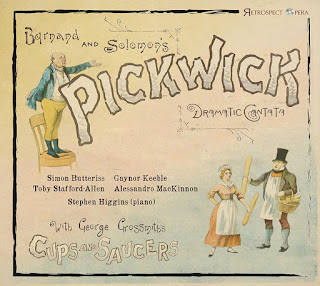Edward Solomon & F.C. Burnand Pickwick, George Grossmith Cups and Saucers; Simon Butteriss, Gaynor Keeble, Toby Stafford-Allen, Alessandro MacKinnon, Stephen Higgins; Retrospect opera
Reviewed by Robert Hugill on May 25 2017
Star rating:
A charming period piece by one of G&S's younger contemporaries
This charming disc introduces us to a rather ignored Victorian talent, the composer Edward Solomon. Here from Retrospect Opera we have Edward Solomon and F.C.Burnand's dramatic cantata Pickwick, performed by Simon Butteriss, Gaynor Keeble, Toby Stafford-Allen and Alessandro MacKinnon, accompanied at the piano by Stephen Higgins. The work is performed alongside George Grossmith's comic scene Cups and Saucers.
Reviewed by Robert Hugill on May 25 2017
Star rating:
A charming period piece by one of G&S's younger contemporaries
This charming disc introduces us to a rather ignored Victorian talent, the composer Edward Solomon. Here from Retrospect Opera we have Edward Solomon and F.C.Burnand's dramatic cantata Pickwick, performed by Simon Butteriss, Gaynor Keeble, Toby Stafford-Allen and Alessandro MacKinnon, accompanied at the piano by Stephen Higgins. The work is performed alongside George Grossmith's comic scene Cups and Saucers.
Edward Solomon started out playing the piano as a boy at the music halls, writing songs and eventually moving on to hit shows and one-act musicals. He was busy in other spheres too, when he died at the age of 40 he left behind him five 'wives', around four daughters, and one son.
Pickwick is a 55 minute piece and uses characters from Dickens' novel, but the scene is complete invention. The piece expands on Pickwick's trial for breach of promise by producing a whole scenario set in his land-lady's house. So we have the said land-lady, Mrs Bardell (Gaynor Keeble), Mr Pickwick (Simon Butteriss), Mrs Bardell's son Tommy (Alessandro MacKinnon) and the Baker (Toby Stafford Allen) who is eagerly wooing Mrs Bardell
The work was premiered in 1889 (the same year as The Gondoliers). The orchestral score does not survive (like a lot theatrical material of the period) but a vocal score was published and so that is what we hear. It does not have too much dialogue, and is full of delightful tunes. Probably not as sophisticated as Sullivan's writing for Gilbert, you sense that Solomon does not have Sullivan's ability to combine melodic felicity with musical complexity. Yet Solomon's scene is certainly worth re-discovering, and you do wonder what his larger theatrical pieces are like. It receives an admirable performance, all the performers seem to be relishing the fun generated, and sing with admirable diction so we hardly need recourse to the libretto. Stephen Higgins does sterling work at the piano, but I do so hope someone produces a version for small ensemble.
George Grossmith's Cups and saucers is a delightfully barmy scene, far wordier than the Solomon and Burnand, but still enjoyable particularly with Simon Butteriss and Gaynor Keeble;s engaging performances.
During his lifetime Solomon was being compared to Sullivan, and whilst this does not seem to be quite the case it is worth bearing in mind Solomon's early death. This is very much a period piece, and of course, it is only really fair to compare Pickwick to something like Trial by Jury. What really counts, of course, is that the team from Retrospect Opera have revived these pieces with such a great sense of fun.
Edward Solomon (1855-1895), F.C. Burnand (1836-1917) - Pickwick
Mr Pickwick - Simon Butteris
Mrs Bardell - Gaynor Keeble
The Baker - Toby Stafford-Allen
Tommy - Alessandro MacKinnon
Stephen Higgins (music direction and piano)
George Grossmith (1847-1912) - Cups and Saucers
General Deelah - Simon Butteriss
Mrs Worcester - Gaynor Keeble
Stephen Higgins (music direction and piano)
Record at the National Opera Studio, Wandsworth, London, 12-13 September 2016
RETROSPECT OPERA RO002 1CD [73.31]
Available from Amazon.
Elsewhere on this blog:
- A fine introduction: Chamber music of Grazyna Bacewicz - CD review
- Beware the Spider!: Intriguing debut disc from Palisander recorder quartet - CD review
- Access all Areas, why are few theatres a pleasure to leave? - feature article
- Gaudent in coelis: Music by Joanna Marsh, Judith Bingham, Sally Beamish - CD review
- Schubert in context: Decades: A Century of Song, 1820s from Malcolm Martineau & friends - CD review
- Colour and movement: Orchestra music by Tomasz Opalka on Warner Classics - CD review
- Early Verdi, teenage Mozart and Britten comedy: Artistic director Stephen Barlow introduces 2017 Buxton Festival - feature article
- Mostly wonderful: Handel's Ariodante from English Concert with Alice Coote - opera review
- Side by side: Brahms, Schumann & Cheryl Frances-Hoad at Wigmore Hall - concert review
- Lyrically moving: Nick Pritchard in title role of Handel's Jephtha - concert review
- Home




.jpg)






As one of the team at Retrospect Opera (a registered UK charity, all profits from recordings go towards making more!), I'm very grateful for this review. There's a couple of details I'd like to clarify, though. Dickensians should know that "Pickwick" is in most respects a dramatization of the first half of chapter 12 of "Pickwick Papers" – the chapter portentously entitled “Descriptive of a very important Proceeding on the part of Mr. Pickwick; no less an epoch in his Life than in this History.” To enlarge the scope of the incident, and to give it a clearer shape, Burnand incorporated some material from the later trial scene. Also, Boosey distinguished the work by bringing it out in their series of “Operettas for the Drawing-Room” and it's that version, arranged by Solomon, that we've recorded (in the absence of any other version). It sparkles!
ReplyDeleteMany thanks for making things a bit clearer!
Delete